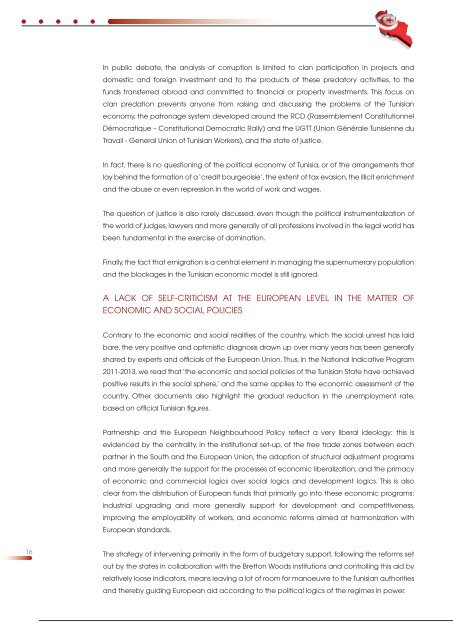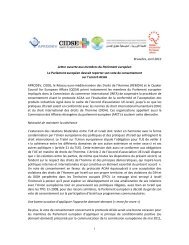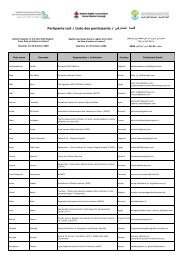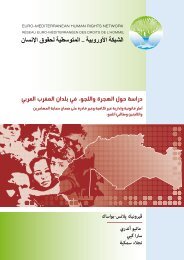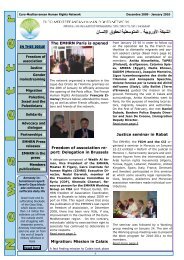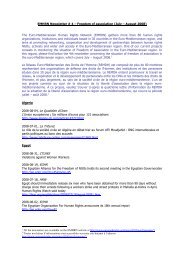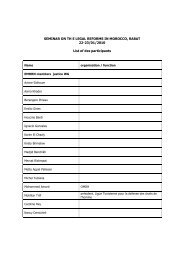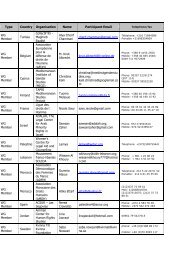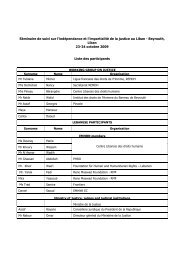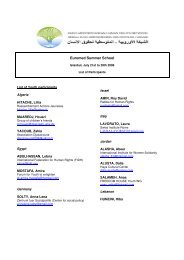tunisia after 14 january and its social and political economy - Refworld
tunisia after 14 january and its social and political economy - Refworld
tunisia after 14 january and its social and political economy - Refworld
You also want an ePaper? Increase the reach of your titles
YUMPU automatically turns print PDFs into web optimized ePapers that Google loves.
In public debate, the analysis of corruption is limited to clan participation in projects <strong>and</strong>domestic <strong>and</strong> foreign investment <strong>and</strong> to the products of these predatory activities, to thefunds transferred abroad <strong>and</strong> committed to financial or property investments. This focus onclan predation prevents anyone from raising <strong>and</strong> discussing the problems of the Tunisian<strong>economy</strong>, the patronage system developed around the RCD (Rassemblement ConstitutionnelDémocratique – Constitutional Democratic Rally) <strong>and</strong> the UGTT (Union Générale Tunisienne duTravail - General Union of Tunisian Workers), <strong>and</strong> the state of justice.In fact, there is no questioning of the <strong>political</strong> <strong>economy</strong> of Tunisia, or of the arrangements thatlay behind the formation of a ‘credit bourgeoisie’, the extent of tax evasion, the illicit enrichment<strong>and</strong> the abuse or even repression in the world of work <strong>and</strong> wages.The question of justice is also rarely discussed, even though the <strong>political</strong> instrumentalization ofthe world of judges, lawyers <strong>and</strong> more generally of all professions involved in the legal world hasbeen fundamental in the exercise of domination.Finally, the fact that emigration is a central element in managing the supernumerary population<strong>and</strong> the blockages in the Tunisian economic model is still ignored.A lack of self-criticism at the European level in the matter ofeconomic <strong>and</strong> <strong>social</strong> policiesContrary to the economic <strong>and</strong> <strong>social</strong> realities of the country, which the <strong>social</strong> unrest has laidbare, the very positive <strong>and</strong> optimistic diagnosis drawn up over many years has been generallyshared by experts <strong>and</strong> officials of the European Union. Thus, in the National Indicative Program2011-2013, we read that ‘the economic <strong>and</strong> <strong>social</strong> policies of the Tunisian State have achievedpositive results in the <strong>social</strong> sphere,’ <strong>and</strong> the same applies to the economic assessment of thecountry. Other documents also highlight the gradual reduction in the unemployment rate,based on official Tunisian figures.Partnership <strong>and</strong> the European Neighbourhood Policy reflect a very liberal ideology: this isevidenced by the centrality, in the institutional set-up, of the free trade zones between eachpartner in the South <strong>and</strong> the European Union, the adoption of structural adjustment programs<strong>and</strong> more generally the support for the processes of economic liberalization, <strong>and</strong> the primacyof economic <strong>and</strong> commercial logics over <strong>social</strong> logics <strong>and</strong> development logics. This is alsoclear from the distribution of European funds that primarily go into these economic programs:industrial upgrading <strong>and</strong> more generally support for development <strong>and</strong> competitiveness,improving the employability of workers, <strong>and</strong> economic reforms aimed at harmonization withEuropean st<strong>and</strong>ards.16The strategy of intervening primarily in the form of budgetary support, following the reforms setout by the states in collaboration with the Bretton Woods institutions <strong>and</strong> controlling this aid byrelatively loose indicators, means leaving a lot of room for manoeuvre to the Tunisian authorities<strong>and</strong> thereby guiding European aid according to the <strong>political</strong> logics of the regimes in power.


